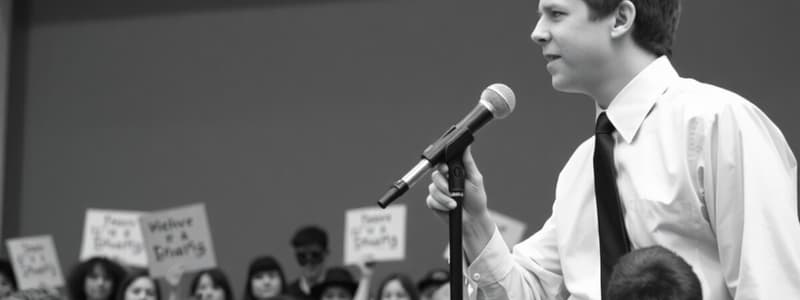Podcast
Questions and Answers
What was the primary reason the Tinker students decided to wear black armbands to school?
What was the primary reason the Tinker students decided to wear black armbands to school?
- To promote a local event
- To protest the Vietnam War (correct)
- To show support for their teachers
- To oppose school dress codes
What action did the school officials take upon learning of the students' plan to wear armbands?
What action did the school officials take upon learning of the students' plan to wear armbands?
- They created a policy banning armbands. (correct)
- They encouraged the students to proceed.
- They contacted law enforcement.
- They held a school assembly on free speech.
What constitutional right did the Tinker family argue was violated?
What constitutional right did the Tinker family argue was violated?
- Right to free speech (correct)
- Right to bear arms
- Right to assemble
- Right to privacy
Which court ultimately agreed to hear the Tinker case?
Which court ultimately agreed to hear the Tinker case?
What did the courts rule regarding the authority of school officials in this case?
What did the courts rule regarding the authority of school officials in this case?
What does the Tinker Test help to define?
What does the Tinker Test help to define?
Which statement best describes the nature of the protest conducted by the Tinker students?
Which statement best describes the nature of the protest conducted by the Tinker students?
When did the Tinker siblings and Eckhardt ultimately return to school after their suspension?
When did the Tinker siblings and Eckhardt ultimately return to school after their suspension?
What did the students' lawyer argue regarding the rights of children?
What did the students' lawyer argue regarding the rights of children?
Which of the following reflects a limitation on student speech according to the content?
Which of the following reflects a limitation on student speech according to the content?
What principle did the Supreme Court establish regarding student speech in the Des Moines Independent Community School District case?
What principle did the Supreme Court establish regarding student speech in the Des Moines Independent Community School District case?
Under what circumstances can schools restrict student speech according to the limits of substantial disruption?
Under what circumstances can schools restrict student speech according to the limits of substantial disruption?
What type of speech was restricted in the Bethel School District No. 403 v. Fraser case?
What type of speech was restricted in the Bethel School District No. 403 v. Fraser case?
What was the ruling in the Hazelwood School District v. Kuhlmeier case regarding school-sponsored speech?
What was the ruling in the Hazelwood School District v. Kuhlmeier case regarding school-sponsored speech?
Why can schools restrict pro-drug speech according to the Morse v. Frederick case?
Why can schools restrict pro-drug speech according to the Morse v. Frederick case?
Which of the following is NOT considered as a limit to student free speech?
Which of the following is NOT considered as a limit to student free speech?
What could happen to a student's speech if it is deemed to interfere with the rights of others?
What could happen to a student's speech if it is deemed to interfere with the rights of others?
In which Supreme Court case was the authority of schools to limit lewd speech confirmed?
In which Supreme Court case was the authority of schools to limit lewd speech confirmed?
What is the primary reason for implementing limits on free speech in schools?
What is the primary reason for implementing limits on free speech in schools?
What distinguishes school-sponsored speech from other types of speech in schools?
What distinguishes school-sponsored speech from other types of speech in schools?
Flashcards are hidden until you start studying
Study Notes
Tinker v. Des Moines Independent Community School District
- In 1965, three students in Des Moines, Iowa, wore black armbands to school to protest the Vietnam War.
- The school created a policy prohibiting armbands, and the students were suspended for wearing them.
- The case reached the Supreme Court, where the students argued that their right to free speech was violated.
- The Supreme Court ruled in favor of the students, establishing the Tinker Test which outlines limitations to student free speech.
The Tinker Test
- Speech that Interferes with Another Student's Rights: Schools can restrict speech that infringes on the rights of other students.
- Speech that Causes Substantial Disruption: Schools can restrict speech that could lead to significant disruptions in the school environment.
- Lewd Speech: Schools can prohibit speech that is inappropriate, obscene, or offensive.
- This was established in the case of Bethel School District No. 403 v.Fraser (1986), where a student gave a speech filled with sexual innuendos at a school assembly.
- School-Sponsored Speech: Schools can regulate school-sponsored activities and publications to ensure they align with educational goals.
- This was established in the case of Hazelwood School District v.Kuhlmeier (1988), where students wrote articles for their school newspaper that the principal decided to censor.
- Pro-Drug Speech: Schools can restrict speech that promotes illegal drug use.
- This was established in Morse v.Frederick (2007), where a student displayed a banner reading "Bong Hits 4 Jesus" during a school event.
Conclusion
- The Tinker Test helps define the limits of student speech while ensuring free speech does not violate the rights of others or disrupt the educational environment.
Studying That Suits You
Use AI to generate personalized quizzes and flashcards to suit your learning preferences.




